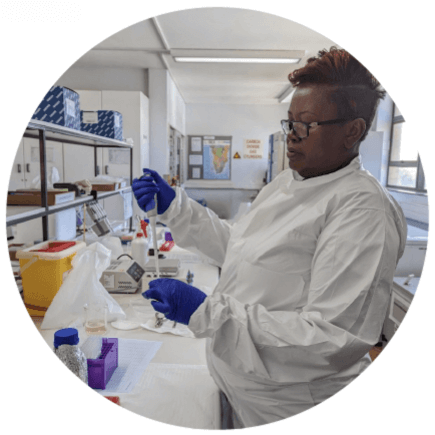About Malaria
Malaria is a life-threatening disease transmitted to humans by certain types of mosquitoes, primarily found in tropical regions. It is both preventable and curable. The infection is caused by Plasmodium parasites and does not spread directly from person to person. Mild symptoms include fever, chills, and headache, while severe symptoms can lead to fatigue, confusion, seizures, and difficulty breathing. In 2022, there were an estimated 249 million malaria cases and 608,000 deaths across 85 countries globally. The African Region bears the highest burden, accounting for 94% of cases (233 million) and 95% of deaths (580,000). Children under five years old represent about 80% of all malaria fatalities in this region.
Artemisinin-based combination therapies (ACTs) are the cornerstone of malaria treatment. However, artemisinin partial resistance has emerged that is characterized by slower parasite clearance times in patients following treatment with ACTs. Although the partner drugs in ACTs continue to be effective, this resistance threatens to undermine the gains made in malaria control. The emergence of drug-resistant malaria strains highlights the necessity for ongoing surveillance and the development of new therapeutic strategies. Resistance to ACTs can lead to increased malaria morbidity and mortality if not managed effectively.
Why Targeted Next-Generation Sequencing (tNGS) is Crucial for Malaria Research
Traditional methods of malaria research, while valuable, often fall short in providing the detailed genetic information required to understand and combat this complex parasite effectively. Paragon Genomics’ CleanPlex Malaria Research NGS Panel transforms malaria research and epidemiology by:
- Providing Deep Insights: Unlocking complex genomic data that reveals the intricate details of the malaria parasite’s biology.
- Accelerating Discovery: Enabling rapid identification of genetic variations that contribute to drug resistance and virulence.
- Enhancing Precision: Offering high-resolution data that improves the accuracy of epidemiological studies and intervention strategies.
By integrating NGS into your malaria research, you join a forefront of scientific exploration that paves the way for innovative treatments, better diagnostics, and more effective public health interventions.
Diverse Applications of NGS in Malaria Research
NGS technology opens a myriad of avenues for malaria research, facilitating breakthroughs that were previously unattainable. The CleanPlex Malaria Research NGS Panel can be applied across various critical areas of malaria research:
Monitoring Drug and Diagnostic Resistance
NGS enables comprehensive surveillance of genetic mutations associated with resistance to antimalarial drugs and diagnostic tools. This application is crucial for:
- Early Detection: Identifying resistance markers before they become widespread, allowing for timely intervention.
- Guiding Treatment Policies: Informing the development of effective treatment protocols based on current resistance patterns.
- Developing New Therapies: Aiding in the discovery of novel drug targets and resistance mechanisms.
Transmission Dynamics and Population Genetics
Understanding the genetic diversity and transmission patterns of malaria parasites is essential for designing effective control strategies. NGS assists in:
- Mapping Transmission Networks: Tracking the spread of malaria within and between populations to identify hotspots and direct control efforts.
- Population Structure Analysis: Investigating the genetic diversity and evolutionary history of malaria parasites to understand their adaptation mechanisms.
- Epidemiological Surveillance: Enhancing the accuracy of tracking malaria cases and predicting outbreaks.
The Advantages of Amplicon Sequencing
NGS encompasses various sequencing methods, but amplicon sequencing stands out for several reasons, making it particularly suited for malaria research:
- Targeted Approach: Amplicon sequencing focuses on specific genomic regions of interest, making it ideal for detecting known mutations related to drug resistance and virulence.
- High Sensitivity: This method can detect low-frequency variants in heterogeneous samples, which is crucial for identifying emerging resistance mutations in malaria populations.
- Cost-Effectiveness: By targeting specific regions, amplicon sequencing reduces the volume of data generated, leading to lower costs in sequencing and data analysis compared to whole-genome sequencing.
- Efficiency: Amplicon sequencing requires less DNA input and has faster turnaround times, enabling more rapid results compared to other methods like whole-genome or metagenomic sequencing.
- Simplicity: The targeted nature simplifies data analysis, reducing the complexity and time required to interpret the results.
Revolutionize Malaria Research with Cutting-Edge NGS Technology
Discover the unparalleled power of Next-Generation Sequencing (NGS) in malaria research with our state-of-the-art product designed to advance your scientific endeavors. Our CleanPlex Malaria NGS Research Panel offers comprehensive insights, high precision, and unprecedented data quality, empowering researchers to tackle malaria with new vigor and effectiveness.
Why CleanPlex Malaria Research NGS Panel?
Community-Driven
Modular Assay Design
Multiple Applications
The multipurpose targeted NGS panel efficiently determines details about the epidemiology and drug resistance all at once. From resistance to transmission and population genetics, the modular design allows researchers to choose from a single primer pool or multiple pools, depending on the application.
Increased Sensitivity
One of the most significant benefits provided by NGS technology is its increased sensitivity, which allows for detection of low frequency mutations. NGS sequencing allows higher sequencing depth for a lowered limit of detection, a crucial aspect to consider when working with limited sample quantities.

Bryan Greenhouse, MD
Professor, Medicine
School of Medicine, UCSF
Dr. Greenhouse’s collaboration with Paragon Genomics promises to revolutionize malaria research and surveillance globally. Our tireless efforts to take this technology forward and help investigators build the genomic surveillance infrastructure in malaria-endemic countries for this disease have great potential for transforming the landscape of malaria research.
Blow are some quotes about the development efforts and the CleanPlex technology from Dr. Greenhouse during an interview.
To find out more, read the full customer spotlight interview here.

Maria Florinda Victor Joao, a technical officer in the Angolan National Malaria Control Programme participates in a practical malaria genomics training at the National Institutes for Communicable Diseases in Johannesburg in March 2023.

Dr. Jessica Briggs leads the Malaria Genomics and Data Analytics Workshop in Kampala, Uganda in September 2022.
Transform Your Malaria Research Today
Empower your research with our CleanPlex Malaria NGS Panel, designed to deliver precise, reliable, and comprehensive genetic insights into the malaria parasite. Join the global effort to eradicate malaria by leveraging the full potential of NGS technology.
Inquire about how to order the CleanPlex Malaria NGS Panel
Custom Targeted NGS Panels for Malaria: Frequently Asked Questions
Paragon Genomics’ NGS panel plays a crucial role in malaria research by providing precise and comprehensive genetic analysis of malaria-causing parasites, primarily various Plasmodium species. This technology enables the accurate detection and differentiation of these parasites, which is essential for appropriate treatment and disease management.
Additionally, the NGS panel facilitates the study of the genetic diversity and evolutionary patterns of the parasite. This is vital for understanding how malaria adapts to different host environments and drug treatments, and for tracking the development and spread of drug resistance. The panel is instrumental in advancing malaria research, and aiding in the development of more effective treatment strategies and preventive measures.
The custom targeted NGS panel developed with Paragon Genomics significantly enhances malaria research by allowing researchers to focus specifically on malaria parasites such as Plasmodium falciparum. This specificity enables the detailed study of the parasite genome, helping to understand its complexities and adaptability, which is crucial in developing effective malaria control strategies.